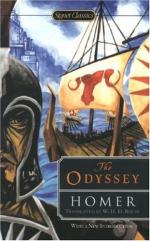Then Eumaeus said, “You have perceived aright, as indeed you generally do; but let us think what will be our best course. Will you go inside first and join the suitors, leaving me here behind you, or will you wait here and let me go in first? But do not wait long, or some one may see you loitering about outside, and throw something at you. Consider this matter I pray you.”
And Ulysses answered, “I understand and heed. Go in first and leave me here where I am. I am quite used to being beaten and having things thrown at me. I have been so much buffeted about in war and by sea that I am case-hardened, and this too may go with the rest. But a man cannot hide away the cravings of a hungry belly; this is an enemy which gives much trouble to all men; it is because of this that ships are fitted out to sail the seas, and to make war upon other people.”
As they were thus talking, a dog that had been lying asleep raised his head and pricked up his ears. This was Argos, whom Ulysses had bred before setting out for Troy, but he had never had any work out of him. In the old days he used to be taken out by the young men when they went hunting wild goats, or deer, or hares, but now that his master was gone he was lying neglected on the heaps of mule and cow dung that lay in front of the stable doors till the men should come and draw it away to manure the great close; and he was full of fleas. As soon as he saw Ulysses standing there, he dropped his ears and wagged his tail, but he could not get close up to his master. When Ulysses saw the dog on the other side of the yard, he dashed a tear from his eyes without Eumaeus seeing it, and said:
“Eumaeus, what a noble hound that is over yonder on the manure heap: his build is splendid; is he as fine a fellow as he looks, or is he only one of those dogs that come begging about a table, and are kept merely for show?”
“This hound,” answered Eumaeus, “belonged to him who has died in a far country. If he were what he was when Ulysses left for Troy, he would soon show you what he could do. There was not a wild beast in the forest that could get away from him when he was once on its tracks. But now he has fallen on evil times, for his master is dead and gone, and the women take no care of him. Servants never do their work when their master’s hand is no longer over them, for Jove takes half the goodness out of a man when he makes a slave of him.”
As he spoke he went inside the buildings to the cloister where the suitors were, but Argos died as soon as he had recognised his master.
Telemachus saw Eumaeus long before any one else did, and beckoned him to come and sit beside him; so he looked about and saw a seat lying near where the carver sat serving out their portions to the suitors; he picked it up, brought it to Telemachus’s table, and sat down opposite him. Then the servant brought him his portion, and gave him bread from the bread-basket.




